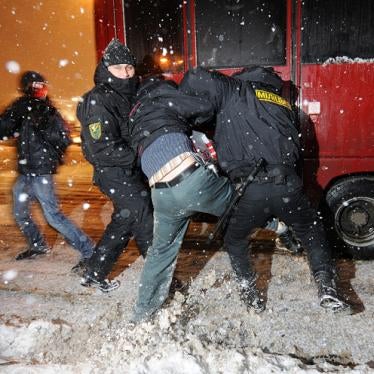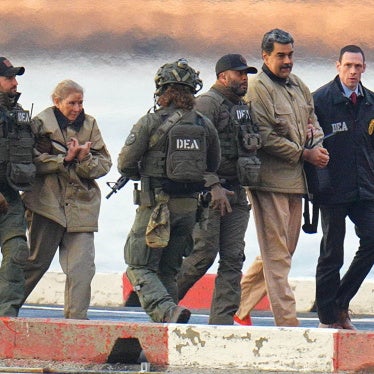Introduction
This memorandum, submitted to the United Nations Committee Against Torture (“the Committee”) in advance of its upcoming review of Belarus, outlines Human Rights Watch’s concerns and recommendations regarding the conditions for and treatment of political prisoners in Belarus, held in connection with the December 2010 post-election unrest.
The memorandum details information about credible allegations of mistreatment of detainees, which in several cases may have risen to torture, and raises concerns pertaining to Convention articles 2, 12, 13, 14 and 16. The detainees also experienced due process violations, rendering their detention unlawful and arbitrary, as well as denying them essential safeguards against ill-treatment.
In addition to concerns about detention conditions and treatment of those detained on politically motivated charges, we consider the Committee’s upcoming review to be a crucial opportunity to highlight broader concerns over the ongoing crackdown against political opposition and civil society in Belarus, including arbitrary detention and harassment of opposition leaders, civil society representatives, lawyers and independent media.
For further information on human rights violations perpetrated by the Belarusian government since the December 2010 presidential elections, please see Human Rights Watch’s report Shattering Hopes: Post-Election Crackdown in Belarus (available at https://www.hrw.org/sites/default/files/reports/belarus0311Web.pdf) and Joint Letters to Members and Observer States of the UN Human Rights Council from February 21 (available at https://www.hrw.org/news/2011/02/21/belarus-joint-ngo-letter-permanent-representatives-all-member-states-un-human-rights) and from September 5 (available at https://www.hrw.org/news/2011/09/05/belarus-joint-ngo-letter-un-human-rights-council).
Political Prisoners in Belarus
Thousands of people were arrested, according to reports by nongovernmental groups, following the December 19 post-election unrest in Minsk. Many were beaten by police, who reportedly used unjustified force to violently break up the protesters. At least 700 persons were charged with participating in an unsanctioned gathering and sentenced to 10-15 days of detention. There were almost no acquittals. International and domestic NGOs that monitored administrative trial proceedings, reported that trials were held behind closed doors, with no journalists or relatives allowed. In most cases, the accused did not have any defense counsel present and were not allowed to call defense witnesses. Most rulings that tribunals handed down contained identical language that accused the defendants of participating in illegal demonstrations. According to Belarusian law an administrative sentence can be appealed within five days, but with no access to legal assistance while being in custody, those sentenced to detention were unable to appeal their sentences. In many cases, the accused did not even receive copies of decisions rendered against them.
During the months following the post-election unrest, the Belarusian authorities launched criminal investigations against at least 61 persons, on charges of rioting or mass disorder. Human rights monitors and independent experts that monitored criminal trials reported that trials lacked due process and that defendants were convicted despite a lack of evidence. An extensive report by the Committee on International Control over the Human Rights situation in Belarus, a coalition of more than 40 NGOs which maintains a permanent human rights monitoring mission on the ground, found no evidence of ‘mass rioting’. The government’s decision to use unsubstantiated criminal charges to prosecute demonstrators seemed aimed at intimidating Belarus political opposition and its supporters.
Human Rights Watch conducted approximately three dozen interviews with people held on riot or mass disorder charges, who were released from detention on their own recognizance or pardoned; lawyers representing those individuals; and relatives of those who were under arrest. In the course of these interviews we received consistent allegations about inhuman conditions of detention and treatment for those charged with criminal offences. Detainees were also denied access to legal counsel, a right not only necessary to ensure fair trial, but a necessary safeguard against ill-treatment.
Although individuals held on riot or public disorder charges have occasionally had a lawyer present during their interrogation, none was allowed to have private meetings with his or her lawyer at any stage of detention. On rare occasions when they did see their lawyers, it was in the presence of police officers or State Security Committee agents. A former detainee, released on his own recognizance, told Human Rights Watch that he did not see his lawyer once during the 41 days he spent in detention. At least four lawyers told Human Rights Watch researchers that they submitted written requests to hold private meetings with their clients. Some waited in line for hours and eventually had to leave without seeing their clients.
Poor detention conditions and ill-treatment
In the course of our research, we received numerous and consistent reports about poor conditions of detention and severe mistreatment of political prisoners which in several cases may have risen to the level of torture.
We interviewed more than a dozen former detainees held on criminal charges after the December events. Most complained about overcrowding, insufficient heating in cells, unhygienic facilities, lack of access to natural light, poor nutrition, and denial of access to medical care. Several detainees, who were beaten by police or security forces or suffered from ill health in detention, told Human Rights Watch that they did not receive adequate medical help. Most detainees were deprived of almost all contact with their families and their correspondence was not delivered.
Although the authorities have pardoned and released from custody most individuals convicted on charges of rioting or participation in mass disorders in relation to the December protests, at this writing at least 11 people remain imprisoned in connection with the December protests. Some of the prisoners who remain in detention experience rapidly declining physical and mental health.
Individual cases
Among those still detained is Zmitser Dashkevich, leader of the Youth Front, who has been placed in solitary confinement eight times since his sentencing in March 2011. According to media reports as well as witness accounts passed on through relatives of other detainees, Dashkevich is being subjected to severe psychological pressure in detention. Reportedly, he is being humiliated and regularly threatened with beatings and even death by the prison staff and other detainees who are loyal to the prison facility’s administration.
Human Rights Watch is also seriously concerned about the health and well-being of Andrei Sannikau, a candidate in the December presidential election who was convicted on trumped-up riot charges and sentenced in May to five years’ imprisonment. In September, Sannikau was transferred from one prison facility to another. The transfer period, which lasted for ten days, was characterized by harsh conditions, including food and sleep deprivation. Throughout the entire duration of the transfer, Sannikau had no contact with family members and no access to his lawyer. Additionally, according to Sannikau’s wife, in the new prison facility Sannikau has been regularly intimidated and threatened by prison staff. Reportedly, he has also been pressured by the prison administration to sign a petition asking for presidential pardon in exchange for his release.
There are also grave health concerns regarding Zmitser Bandarenka, Sannikau’s aide and coordinator of ‘European Belarus’ campaign. Bandarenka’s pre-existing spinal condition has worsened significantly, allegedly as the result of ill-treatment to which he was subjected during six months in KGB custody. We have been told that he was forced into stress positions, such as being forced to stand in a stretched stance for up to two hours and was compelled to run up and down steps carrying heavy objects. In addition, he was reportedly forced to sleep on floorboards and did not have a toilet in his cell. Despite his serious and rapidly deteriorating condition, the prison administration refused to let him see a neurosurgeon. In July Bandarenka was finally admitted for emergency spinal surgery but then transferred to a prison colony even though he now requires constant medical attention, not available at the colony. In the facility detainees may not lie down during the day and since Bandarenka has difficulties sitting after his surgery, he is forced to spend most of his days standing up. As a result of his spinal injury one of Bandarenka’s legs is now paralyzed and the other is at risk of paralysis.
Recommendations
We hope the see the Committee use the opportunity of its upcoming review of Belarus to highlight grave concern about the situation of political prisoners and urge the government of Belarus to take the following immediate steps:
- Conduct a thorough and impartial investigation into the police use of force on December 19, 2010;
- Investigate the treatment of all those arrested in connection with the protests, including violations of procedural rights during summary trials, and the legality of, and treatment in detention; ensure law enforcement officers responsible for violations are held accountable and victims receive adequate compensation;
- Ensure that all detainees have unimpeded access to counsel from the outset of detention and throughout the period of detention, that all detainees are allowed to speak with a lawyer privately and be interrogated only in the presence of their lawyer;
- Ensure that all detainees receive necessary medical assistance;
- Immediately and unconditionally release all political prisoners who are held on trumped-up charges of rioting or public disorder following the December 19, 2010 protests.







